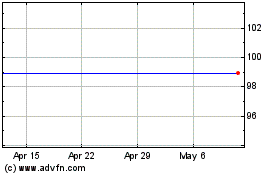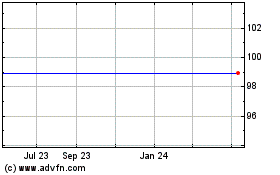Judge Clears AT&T, Time Warner to Close Deal -- 3rd Update
15 June 2018 - 10:48AM
Dow Jones News
By Drew FitzGerald and Brent Kendall
WASHINGTON -- AT&T Inc. Thursday completed its purchase of
Time Warner Inc., as U.S. District Judge Richard Leon authorized it
to do so after the Justice Department decided not to request a
delay that could have held up the combination.
On Tuesday, Judge Leon denied the Justice Department's attempt
to block the deal and said the companies should be allowed to close
their transaction before a June 20 deadline, which entitled Time
Warner to a $500 million payment if missed.
A Justice Department official said Thursday the government still
hasn't decided whether it will appeal the decision, but the agency
won't seek a stay of Judge Leon's ruling, which could have
prevented AT&T from finalizing the acquisition during any
appellate litigation.
While the government isn't standing in the way of the deal
closing, it is reserving its right to appeal and try to break up
the joined company later on.
Makan Delrahim, the Justice Department's antitrust chief, said
Wednesday evening that the agency was still reviewing the 172-page
ruling. "Do I agree with it? No, but if I was faced with the same
facts and case and economics would I bring it again? Yes," said Mr.
Delrahim, adding that he believes "with every single bone in my
body that the transaction would cause harm."
Judge Leon issued a strongly worded opinion Tuesday that took
the unusual step of urging the government to let the companies
close their deal without further legal interference. He said he
hoped the Justice Department would have the "wisdom" not to seek an
emergency stay of his ruling in light of the considerable time and
expense devoted to the merger review, as well as the commanding win
by the companies in his courtroom.
The judge's comments likely would have undermined any effort by
the department to persuade a higher court to put the merger on hold
during more legal proceedings.
The Justice Department hadn't lost a merger case in more than a
decade, so it hasn't faced a question of appeal in a long time. Its
calculations on whether to appeal could involve a number of
considerations: likelihood of success, resources and the broader
importance of the legal issues at stake.
In a letter to the Justice Department on Thursday, AT&T lead
attorney Daniel Petrocelli told the agency that AT&T would keep
Time Warner's cable networks, such as CNN and TNT, in a business
unit separate from AT&T's communications assets, which include
DirecTV.
The lawyer said AT&T would have no role in setting Turner
prices and would build a "firewall" between Turner and AT&T to
prevent the transfer of any competitive or sensitive information
about contract terms or pricing.
Such conditions would make it easier to unwind the combination
were the government to win on appeal. Mr. Petrocelli said AT&T
would keep the conditions in place until the conclusion of the
legal proceedings or Feb. 28, 2019.
The companies had been waiting to see if the Justice Department
would seek a stay of the decision before closing their deal, which
would unite one of the biggest providers of cellphone and
television services with the Warner Bros. studio, CNN and HBO. An
AT&T spokesman declined to comment.
Judge Leon in his ruling Tuesday emphasized that he was relying
heavily on the specific facts of the case and not issuing a broad
ruling that would threaten the government's ability to bring future
cases against vertical mergers that combine complementary
companies. Some legal observers, however, have said the ruling is a
considerable blow to the government, no matter the judge's
statement.
The Federal Trade Commission, which shares antitrust authority
with the Justice Department, has faced appeals decisions in merger
cases during the Justice Department's long winning streak.
Sometimes the FTC has appealed, and won, including in hospital
merger cases. It also won a decade ago when an appeals court said a
judge wrongly dismissed the commission's challenge to a grocery
store acquisition by Whole Foods Markets.
After the ruling, the FTC and Whole Foods reached a settlement
that required the company to sell off some stores but not unwind
the entire transaction.
--Sarah Krouse contributed to this article.
Write to Drew FitzGerald at andrew.fitzgerald@wsj.com and Brent
Kendall at brent.kendall@wsj.com
(END) Dow Jones Newswires
June 14, 2018 20:33 ET (00:33 GMT)
Copyright (c) 2018 Dow Jones & Company, Inc.
Time Warner (NYSE:TWX)
Historical Stock Chart
From Dec 2024 to Jan 2025

Time Warner (NYSE:TWX)
Historical Stock Chart
From Jan 2024 to Jan 2025
